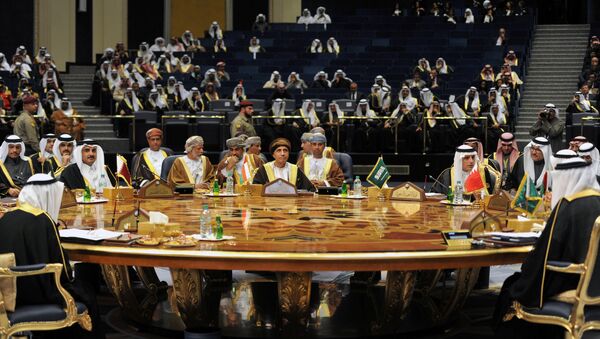MOSCOW (Sputnik) – On Tuesday, the United Arab Emirates and Saudi Arabia announced that they were forming a new alliance separate from the Gulf Cooperation Council (GCC), called the Joint Cooperation Committee. The deal was announced ahead of a GCC summit in Kuwait City.
According to UAE Foreign Minister Sheikh Abdullah bin Zayed Al Nahyan, the new committee will cooperate on military, political, trade and economic matters, as well as with respect to culture.
Gulf Cooperation Council at Risk
"With this new structure between [the Kingdom of Saudi Arabia] KSA and UAE, they are clearly saying that they will not count anymore on the GCC to coordinate any strategic issue such as defense, security, the military or the economy. Simply put, the UAE and KSA do not trust the other states of the GCC anymore, mainly Qatar, but also Oman and Kuwait, to deal with what they consider internal and external threats," Luciano Zaccara, a research assistant professor in Gulf politics at the Qatar University Gulf Studies Center, said.
Professor Beverley Milton-Edwards, a visiting fellow at Brookings Doha Center, noted that the decision to create the new alliance "threatens the founding principle of the GCC."
President His Highness #SheikhKhalifa issues Resolution forming #UAE- #Saudi #JointCooperationCommittee. Is this a #GCC 2.0?
— Sameer Mallya (@sameer_mallya) 7 декабря 2017 г.
https://t.co/YwefQKVPdW
"This principle is based on unity and integration among all the member states. While some dimensions of the newly announced bilateral relationship are nothing new, others underscore the growing rift within the region. A trade partnership, for example, works against previously agreed-upon plans and projects to deepen economic relations between all the GCC states and not just some. Hence, the move does little to support the GCC or shore up its battered image," Milton-Edwards explained.
READ MORE: GCC Gamble: How 'Arab NATO, EU and UN' is Falling Apart at the Seams
According to the expert, this new partnership could signal the beginning of the end for the GCC, as it gives other member states of the council freedom to pursue their own policies and agendas.
Implications for the Region
"There is little to indicate from the news of this agreement that there is a willingness from Saudi Arabia or the UAE to promote an end to the ongoing dispute with Qatar. Despite the best efforts of Kuwaiti mediators, it would appear that the old adage ‘you can bring a horse to water but you can’t make it drink’ best describes the position of states like Saudi Arabia," Milton-Edward said, adding that Saudi Crown Prince Mohammad bin Salman "has indicated that the Qatar issue is slipping down his list of priorities."
Saudi Arabia and the United Arab Emirates undoubtedly are preoccupied with the events in war-torn Yemen, "but in the meantime the GCC and its citizens are all losers in the dispute with Qatar," the expert added.
United Arab Emirates & #Saudi Arabia form new military and trade partnership separate from the Gulf Cooperation Council (GCC), according to a statement issued by the #UAE.
— Anthony Rose (@Rosyboy123) 6 декабря 2017 г.
"In any case, it is a very bad news that is creating more uncertainty, and will not contribute at all towards easing the current tension existing in the region," Zaccara said.
In November, the Saudi-led coalition, which is conducting air strikes in Yemen at the request of the country’s President Abd Rabbuh Mansur Hadi, announced it was closing Yemen's air, ground and sea borders in order to halt alleged weapons deliveries from Iran in support of the Houthi rebels fighting against the government of Hadi.
In June, Saudi Arabia, Egypt, Bahrain and the UAE cut off diplomatic relations and communication with Qatar, accusing the country of supporting terrorism and interfering in their domestic affairs. Several other countries followed suit, breaking off relations or reducing the level of their diplomatic representation in Qatar. Doha, in its turn, refuted accusations and criticized restrictive measures imposed on it.




